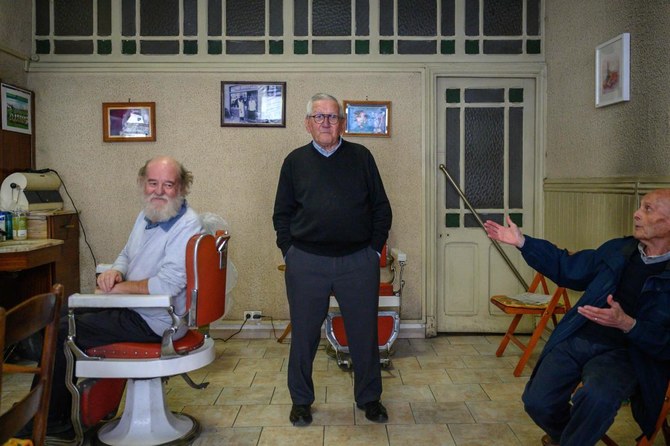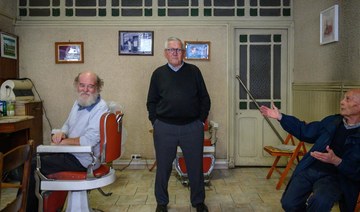TOKYO: Japanese women who say “Me too” do so at their own risk.
Online comments accused Rika Shiiki of lying and being a publicity hound when she tweeted that she lost business contracts after refusing to have sex with clients. Some said that by agreeing to dine with a man, she led him on.
“The comments I received were disproportionately negative,” the 20-year-old university student and entrepreneur told a TV talk show in December. “We need to create a society where we can speak up. Otherwise sexual harassment and other misconduct will persist forever.”
The #MeToo movement has not caught on in Japan, where speaking out often draws criticism rather than sympathy, even from other women.
In a patriarchal society where women have long taken the blame, many victims try to forget attacks and harassment instead of seeking support and justice, said Mari Miura, a political science professor at Sophia University in Tokyo.
“Japan lacks such a sisterhood,” she said. “It’s an exhausting and intimidating process. ... It’s quite natural that victims feel reluctant to speak up.”
One woman, journalist Shiori Ito, went public last year. She held a news conference after prosecutors decided not to press charges against a prominent TV newsman whom she had accused of raping her after he invited her to discuss job opportunities over dinner and drinks in 2015.
Many online comments criticized her for speaking out, looking too seductive and ruining the life of a prominent figure. Some women called her an embarrassment, she told The Associated Press.
The October release of Ito’s book “Blackbox” detailing her ordeal came as the #MeToo phenomenon was making headlines in America. It prompted some discussion in Japan, but only a handful of other women came forward.
“Many people think Shiori’s problem has nothing to do with them ... and that’s why #MeToo isn’t growing in Japan,” said lawyer Yukiko Tsunoda, an expert on sex crimes. In Japan, sexually assaulted women are traditionally called “the flawed,” she said.
Nearly three quarters of rape victims said they had never told anyone, and just over 4 percent had gone to police, according to a 2015 government survey. The study found that one in 15 Japanese women had been raped or forced to have sex.
Victims often shy away from going to court out of fear, privacy concerns or losing jobs, Tsunoda said.
Justice Ministry statistics show only one-third of rape cases go to court, and punishment is not severe. Of the 1,678 people tried for sexual assault in 2017, only 285, or 17 percent, were sentenced to prison for three years or longer. In November, Yokohama prosecutors, without saying why, dropped the case against six students from a leading university who had been arrested for the alleged gang-rape of a teenage female student after getting her drunk. The university expelled three of them.
Popular writer Haruka Ito, who goes by the pen name Ha-Chu, was criticized after revealing in December that she had faced sexual and other harassment by a senior male employee when both worked at Dentsu, Japan’s largest advertising agency.
The alleged harasser, whom she identified by name, apologized in a statement and quit as head of his own company, though he denied the harassment was sexual.
Ha-chu said in a statement that she initially tried to endure and forget the ordeal, fearing that exposing it would hurt her image and cause problems for her former colleagues. After news of the journalist Ito’s case and the #MeToo movement, “I decided to speak out,” she said.
Conformist pressure in Japan discourages women from speaking out or saying “no” to many things, including unwanted sex, said Saori Ikeuchi, a former lawmaker and gender diversity activist.
That mindset has silenced virtually all of Japan’s so-called “comfort women,” who were sexually abused as prostitutes for the wartime military, while Japan has shown little sympathy to victims from Korea and elsewhere, she said.
Ito, the journalist, said that after she became dizzy and passed out in a restroom, her alleged attacker, Noriyuki Yamaguchi, took her to his hotel room and raped her while she was incapacitated.
The alleged assault was just the beginning of her ordeal, Ito said. The women’s clinic she visited the next day lacked expertise on rape, and a rape victim support center refused to give her advice on the phone. Police required her to recount the ordeal repeatedly and to demonstrate it with a life-sized doll, she said.
Ito said it took three weeks to get police to accept her criminal complaint and start investigating. She held a news conference in May, announcing that she had requested a court-appointed citizens’ panel to review the decision to drop the case. The inquest in September agreed with the decision not to indict.
Yamaguchi has denied any wrongdoing in published articles and on Facebook. Ito has filed a civil lawsuit against him, demanding 10 million yen ($93,000) in compensation for her suffering from the alleged rape, and seeking any clues as to why he was let go and never arrested.
“I thought about how I could change the situation, and I had no choice but to speak out about my experience,” she said.
A group of opposition lawmakers has started its own investigation, seeking to find if the charges were dropped because of Yamaguchi’s connections to powerful political officials.
National Police Agency official Junichiro Kan told the lawmakers at a recent hearing that Ito’s case was properly handled. Police say they have tried to be more sensitive to the feelings of victims while guarding against wrongful accusations.
Mika Kobayashi, a rape victim, runs a self-help group that has exchanged thousands of #MeToo experiences, but only anonymously among themselves.
She said she was pushed into a car and raped on her way home in 2000. She reported the attack to police, but the attacker hasn’t been found. She has since published books about her recovery from the ordeal, to raise public awareness.
Her focus is on providing support and understanding for victims, rather than being an activist.
“I used to think of myself as someone hiding a big secret, a sex assault victim and unclean,” she said. “I’m so grateful I could connect with fellow victims. They gave me strength.”
The knowledge that others also blamed themselves and lost self-esteem has helped her to heal slowly, Kobayashi said.
“I think it’s also OK not to speak up,” she said. “I respect any decision that makes a victim feel most comfortable.”
Saying ‘Me Too’ in Japan has risk of being bashed, ignored
Saying ‘Me Too’ in Japan has risk of being bashed, ignored

Palestinian prisoner in Israel wins top fiction prize

- The mask in the novel’s title refers to the blue identity card that Nur, an archaeologist living in a refugee camp in Ramallah, finds in the pocket of an old coat belonging to an Israeli
ABU DHABI: Palestinian writer Basim Khandaqji, jailed 20 years ago in Israel, won a prestigious prize for Arabic fiction on Sunday for his novel “A Mask, the Color of the Sky.”
The award of the 2024 International Prize for Arabic Fiction was announced at a ceremony in Abu Dhabi.
The prize was accepted on Khandaqji’s behalf by Rana Idriss, owner of Dar Al-Adab, the book’s Lebanon-based publisher.
Khandaqji was born in the Israeli-occupied West Bank city of Nablus in 1983, and wrote short stories until his arrest in 2004 at the age of 21.
He was convicted and jailed on charges relating to a deadly bombing in Tel Aviv, and completed his university education from inside jail via the Internet.
The mask in the novel’s title refers to the blue identity card that Nur, an archaeologist living in a refugee camp in Ramallah, finds in the pocket of an old coat belonging to an Israeli.
Khandaqji’s book was chosen from 133 works submitted to the competition.
Nabil Suleiman, who chaired the jury, said the novel “dissects a complex, bitter reality of family fragmentation, displacement, genocide, and racism.”
Since being jailed Khandaqji has written poetry collections including “Rituals of the First Time” and “The Breath of a Nocturnal Poem.”
He has also written three earlier novels.
Mexican doctor claims victory in $28 Cartier earrings battle

MEXICO CITY: A Mexican man has claimed a victory over French luxury brand Cartier, saying an error allowed him to buy two pairs of earrings for $28 that were supposed to cost nearly $28,000.
After a four-month struggle, doctor Rogelio Villarreal said he had finally received the jewelry, which he accused the company of refusing to deliver after his online purchase in December.
According to Villarreal, he came across the low-priced earrings while browsing Instagram.
“I swear I broke out in a cold sweat,” he wrote on the social media platform X.
Cartier declined to recognize the purchase and offered Villarreal a refund, as well as a bottle of champagne and a passport holder as compensation, according to a company letter shared by the doctor.
But Villarreal refused and decided to take the case to Mexico’s consumer protection agency, which ruled in favor of the doctor.
Cartier accepted the decision, Villarreal announced.
“War is over. Cartier is complying,” he wrote.
French barber still trimming at 90

- “I love this job, it’s in my bones,” he said
- Even with arthritis, he is on his feet from Tuesday to Saturday, tending to his customers’ hair and beards in his shop in the small southern town of Saint-Girons
SAINT-GIRONS, France: French barber Roger Amilhastre, 90, could have hung up his clippers decades ago but he said his passion for hair gives him a reason to get up in the morning.
“I love this job, it’s in my bones,” he said, leaning on one of his cast-iron barber’s chairs from the 1940s.
“And despite my age, my hands still don’t shake.”
Even with arthritis, he is on his feet from Tuesday to Saturday, tending to his customers’ hair and beards in his shop in the small southern town of Saint-Girons in the foothills of the Pyrenees.
“I would have liked to retire at 60, but my wife was sick and I needed to pay for the care home,” he said, which cost more than 2,000 euros ($2,150) a month.
Even after his wife died in January, he kept going to work to stave off the sad thoughts.
“I’m not grumpy getting up” to go to work, he said.
France’s national hairdressers’ union believes Amilhastre may be France’s oldest active barber.
“We have a few who continue late in life, but 90 years old is exceptional,” union president Christophe Dore told AFP.
“I’m not sure if he is France’s oldest barber, but if not, he can’t be far off,” he added.
According to the national statistics institute INSEE, a little more than half a million people over 65 still work in France.
In the southern region of Occitanie, where Amilhastre lives, only 1.65 percent of people older than 70 years old still work, including 190 79-year-olds. But statistics do not go beyond that age.
Many of Amilhastre’s customers call him Achille, after his father who founded the barber’s shop in 1932, giving it his name and then teaching his son the profession.
The shop witnessed the German occupation of France during World War II.
“During the war, German police came to find my father to groom a captain who had broken his leg,” Amilhastre said.
German troops had taken over a large stately home in town called Beauregard.
“We were scared because they used to say that anyone who went up to Beauregard never came back,” he said.
“Luckily he did.”
The 90-year-old said he remembered a “tough period” for businesses when he first picked up the scissors in 1947 a few years after the war ended.
But then the town rebounded, he said, with its men following a flurry of new hair trends from greased back quiffs in the 1950s to 1970s bowl cuts.
The barber’s shop survived an economic downturn as local paper mills closed in the 1980s sparking mass layoffs, and supermarkets pushed small shops out of business.
“People started looking for work further afield, so we had to adapt and stay open later in the evening,” Amilhastre said.
That same decade, the AIDS epidemic sent customers into a worried frenzy.
“People were scared. They no longer asked to be shaved and when we did, we were petrified there’d be a cut, that someone would bleed and the virus would be passed on to the next customer,” he said.
Jean-Louis Surre, 67, runs the nearby cafe where Amilhastre once taught him to play billiards as a young boy.
Behind his bar, Surre said he still remembered his mother taking him across the road to see Amilhastre for a haircut every month as a child.
“He’d pump up the chair to reach the mirror, use his clippers and then at the end perfume you with some cologne — you know, squeezing those little pumps,” he said.
He is one of several old-timers to regularly drop by Achille’s — even just to read the newspaper or have a chat.
Inside the barber’s, Jean Laffitte, a balding 84-year-old, said he no longer really needed a haircut.
“With what little is left up there, these days I come out of friendship,” he said.
China’s Shenzhou-18 mission docks with space station

- The astronauts took off from the Jiuquan Satellite Launch Center in China’s northwest at 8:59 p.m. local time Thursday
- The astronauts will stay at the Tiangong space station for six months, carrying out experiments
JIUQUAN, China: A spaceship carrying three astronauts from China’s Shenzhou-18 mission safely docked at Tiangong space station Friday, state-run media reported, the latest step in Beijing’s space program that aims to send astronauts to the Moon by 2030.
The crew took off in a capsule atop a Long March-2F rocket from the Jiuquan Satellite Launch Center in China’s northwest at 8:59 p.m. local time 1259 GMT) Thursday.
By early Friday the spacecraft had “successfully docked” with the space station, state-run news agency Xinhua reported, citing the China Manned Space Agency.
The mission is led by Ye Guangfu, a fighter pilot and astronaut who was previously part of the Shenzhou-13 crew in 2021.
He is joined by astronauts Li Cong and Li Guangsu, who are heading into space for the first time.

Onlookers cheered as the rocket blasted off into the night sky, an AFP journalist at the scene said.
Xinhua said the launch had been declared a “complete success.”
The astronauts will stay at the Tiangong space station for six months.
There they plan to carry out experiments “in the fields of basic physics in microgravity, space material science, space life science, space medicine and space technology,” the China Manned Space Agency has said.
They will also try and create an aquarium onboard and seek to raise fish in zero gravity, according to Xinhua.
“Not only will the taikonauts find joy in the space ‘aquarium,’ but it may also pave the way for their future counterparts to enjoy nutritious fish from their own in-orbit harvests,” it added.

They will also conduct experiments on “fruit flies and mice,” a researcher quoted by the agency said.
The new crew will replace the Shenzhou-17 team, who were sent to the station in October.
Plans for China’s “space dream” have been put into overdrive under President Xi Jinping.
The world’s second-largest economy has pumped billions of dollars into its military-run space program in an effort to catch up with the United States and Russia.
Beijing also aims to send a crewed mission to the Moon by 2030, and plans to build a base on the lunar surface.
China has been effectively excluded from the International Space Station since 2011, when the United States banned NASA from engaging with the country — pushing Beijing to develop its own orbital outpost.
That station is the Tiangong, which means “heavenly palace” — the crown jewel of a space program that has landed robotic rovers on Mars and the Moon, and made China the third country to independently put humans in orbit.
It is constantly crewed by rotating teams of three astronauts, with construction completed in 2022.
The Tiangong is expected to remain in low Earth orbit at between 400 and 450 kilometers (250 and 280 miles) above the planet for at least 10 years.
Algeria’s first KFC restaurant reopens without logo following Gaza protests

- Protesters gathered outside outlet last week in solidarity with Palestinians
- KFC parent company Yum! Brands has faced backlash for its ties with Israel
LONDON: Algeria’s first Kentucky Fried Chicken outlet has resumed operations after a temporary closure prompted by a series of pro-Palestinian demonstrations last week.
However, the restaurant, situated in the Algiers suburb of Dely Ibrahim, reopened its doors without the familiar Col. Sanders logo on its exterior.
It remains unclear if the outlet has had a change of ownership or remains under the umbrella of Yum! Brands, the parent company of KFC.
Demonstrators gathered outside the eatery on April 16, calling for a boycott and expressing solidarity with Palestinians amid the Gaza conflict.
Protesters draped in Palestinian flags voiced support for “Palestinian martyrs” while obstructing access to the storefront.
The restaurant has faced a backlash due to its perceived ties to Israel, with Yum! Brands having made investments in Israeli startups, including TicTuk, a company that allows customers to order food on social networks and message apps, and Dragontail, a system software company specializing in food processing.
In response, the Boycott, Divestment, Sanctions movement designated KFC’s sister company, Pizza Hut, as an “organic boycott target,” due to the “brands’ complicity in Israel’s genocide and apartheid against Palestinians.”
بعد أيام من افتتاح فرعها الأول، KFC الجزائر تزيل شعار علامتها وتُغلق أبوابها!
— أحمد داود (@AhmadDaoud14) April 17, 2024
منذ افتتاحها تعالت أصوات مقاطعتها، ووقفات احتجاجية أمامها، واستنكارٌ لمنح الترخيص لوكيلها! #الجزائر
pic.twitter.com/rIaOG80xTi
While the temporary closure of the KFC outlet was hailed as a success by demonstrators, its reopening sparked disappointment among some Algerians.
The incident underscores challenges and employment ramifications stemming from boycotts related to the Gaza conflict.
Since the start of the war, regional franchises of McDonald’s, one of the key boycotted brands, have distanced themselves from the parent company, arguing that they are 100 percent local.
The opening of a KFC branch in Algeria was noteworthy given the nation’s historical aversion to Western food chains, as well as its stringent foreign investment regulations, which typically prohibit the establishment of foreign food or beverage franchises.
Previous efforts to establish outlets without official approval, such as the brief appearance of a counterfeit “Starbucks,” have been met with swift action and closure.




















